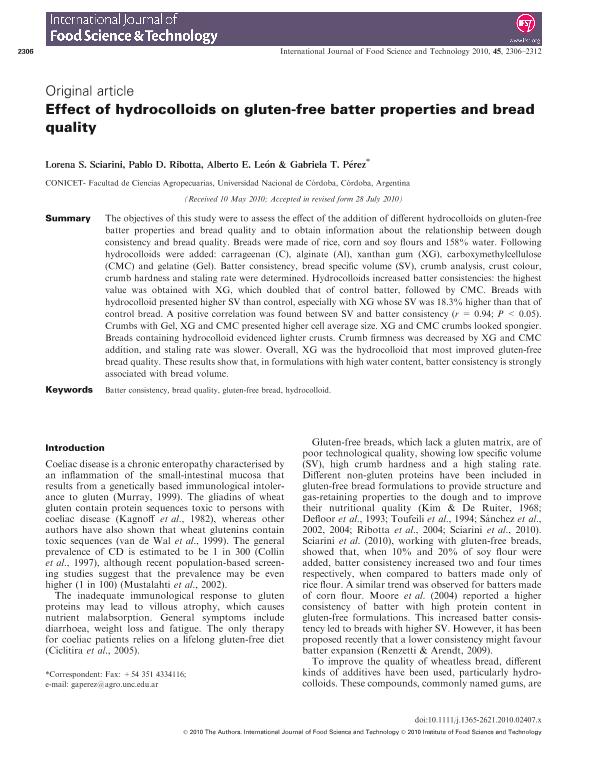Mostrar el registro sencillo del ítem
dc.contributor.author
Sciarini, Lorena Susana

dc.contributor.author
Ribotta, Pablo Daniel

dc.contributor.author
Leon, Alberto Edel

dc.contributor.author
Perez, Gabriela Teresa

dc.date.available
2023-02-27T10:10:04Z
dc.date.issued
2010-07
dc.identifier.citation
Sciarini, Lorena Susana; Ribotta, Pablo Daniel; Leon, Alberto Edel; Perez, Gabriela Teresa; Effect of hydrocolloids on gluten-free batter properties and bread quality; Wiley Blackwell Publishing, Inc; International Journal of Food Science and Technology; 45; 11; 7-2010; 2306-2312
dc.identifier.issn
0950-5423
dc.identifier.uri
http://hdl.handle.net/11336/188871
dc.description.abstract
The objectives of this study were to assess the effect of the addition of different hydrocolloids on gluten-free batter properties and bread quality and to obtain information about the relationship between dough consistency and bread quality. Breads were made of rice, corn and soy flours and 158% water. Following hydrocolloids were added: carrageenan (C), alginate (Al), xanthan gum (XG), carboxymethylcellulose (CMC) and gelatine (Gel). Batter consistency, bread specific volume (SV), crumb analysis, crust colour, crumb hardness and staling rate were determined. Hydrocolloids increased batter consistencies: the highest value was obtained with XG, which doubled that of control batter, followed by CMC. Breads with hydrocolloid presented higher SV than control, especially with XG whose SV was 18.3% higher than that of control bread. A positive correlation was found between SV and batter consistency (r = 0.94; P < 0.05). Crumbs with Gel, XG and CMC presented higher cell average size. XG and CMC crumbs looked spongier. Breads containing hydrocolloid evidenced lighter crusts. Crumb firmness was decreased by XG and CMC addition, and staling rate was slower. Overall, XG was the hydrocolloid that most improved gluten-free bread quality. These results show that, in formulations with high water content, batter consistency is strongly associated with bread volume.
dc.format
application/pdf
dc.language.iso
eng
dc.publisher
Wiley Blackwell Publishing, Inc

dc.rights
info:eu-repo/semantics/openAccess
dc.rights.uri
https://creativecommons.org/licenses/by-nc-sa/2.5/ar/
dc.subject
BATTER CONSISTENCY
dc.subject
BREAD QUALITY
dc.subject
GLUTEN-FREE BREAD
dc.subject
HYDROCOLLOID
dc.subject.classification
Alimentos y Bebidas

dc.subject.classification
Otras Ingenierías y Tecnologías

dc.subject.classification
INGENIERÍAS Y TECNOLOGÍAS

dc.title
Effect of hydrocolloids on gluten-free batter properties and bread quality
dc.type
info:eu-repo/semantics/article
dc.type
info:ar-repo/semantics/artículo
dc.type
info:eu-repo/semantics/publishedVersion
dc.date.updated
2023-02-02T23:14:00Z
dc.journal.volume
45
dc.journal.number
11
dc.journal.pagination
2306-2312
dc.journal.pais
Reino Unido

dc.journal.ciudad
Manchester
dc.description.fil
Fil: Sciarini, Lorena Susana. Universidad Nacional de Córdoba; Argentina. Consejo Nacional de Investigaciones Científicas y Técnicas. Centro Científico Tecnológico Conicet - Córdoba; Argentina
dc.description.fil
Fil: Ribotta, Pablo Daniel. Universidad Nacional de Córdoba; Argentina. Consejo Nacional de Investigaciones Científicas y Técnicas. Centro Científico Tecnológico Conicet - Córdoba; Argentina
dc.description.fil
Fil: Leon, Alberto Edel. Universidad Nacional de Córdoba; Argentina. Consejo Nacional de Investigaciones Científicas y Técnicas. Centro Científico Tecnológico Conicet - Córdoba; Argentina
dc.description.fil
Fil: Perez, Gabriela Teresa. Universidad Nacional de Córdoba; Argentina. Consejo Nacional de Investigaciones Científicas y Técnicas. Centro Científico Tecnológico Conicet - Córdoba; Argentina
dc.journal.title
International Journal of Food Science and Technology

dc.relation.alternativeid
info:eu-repo/semantics/altIdentifier/url/https://ifst.onlinelibrary.wiley.com/doi/10.1111/j.1365-2621.2010.02407.x
dc.relation.alternativeid
info:eu-repo/semantics/altIdentifier/doi/http://dx.doi.org/10.1111/j.1365-2621.2010.02407.x
Archivos asociados
